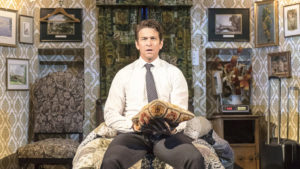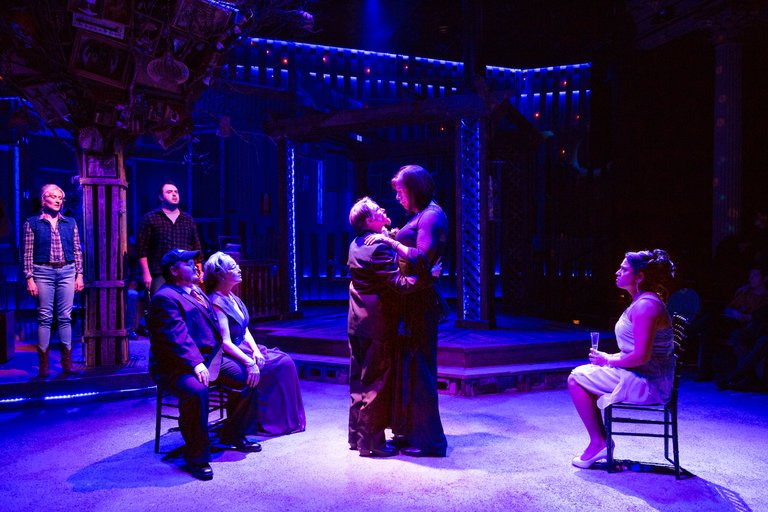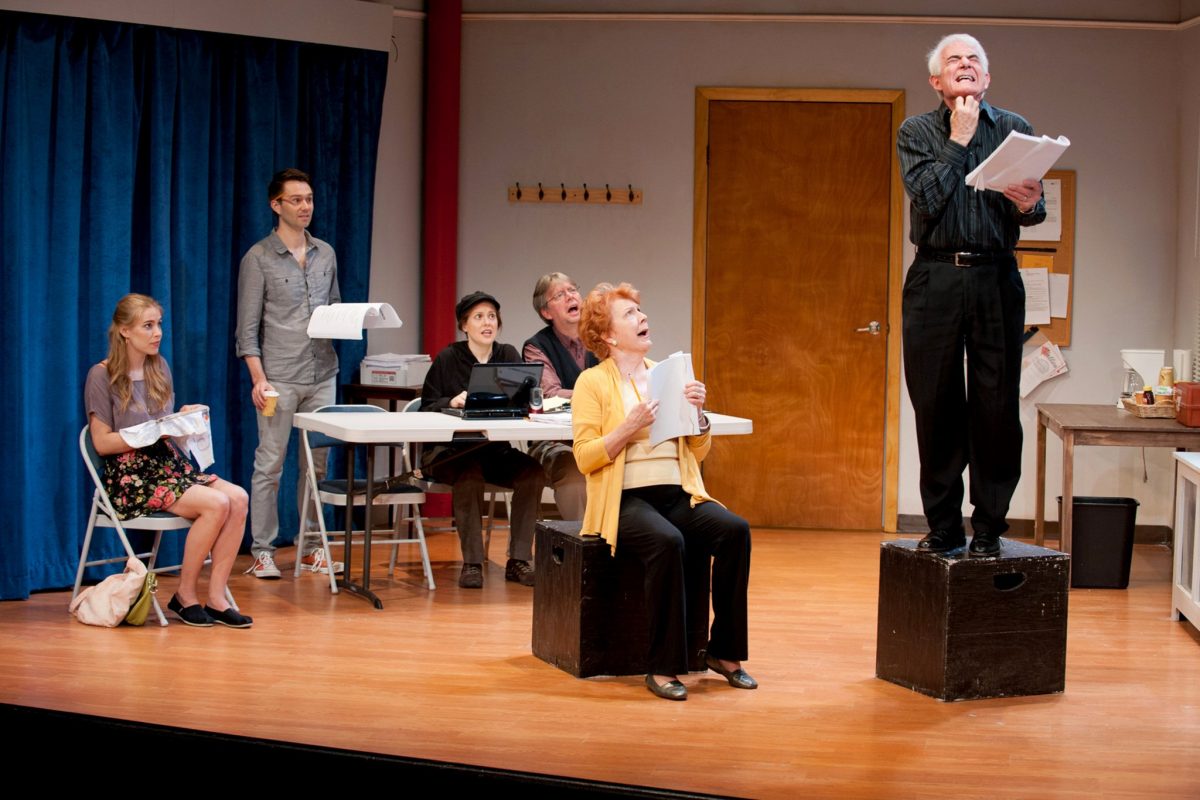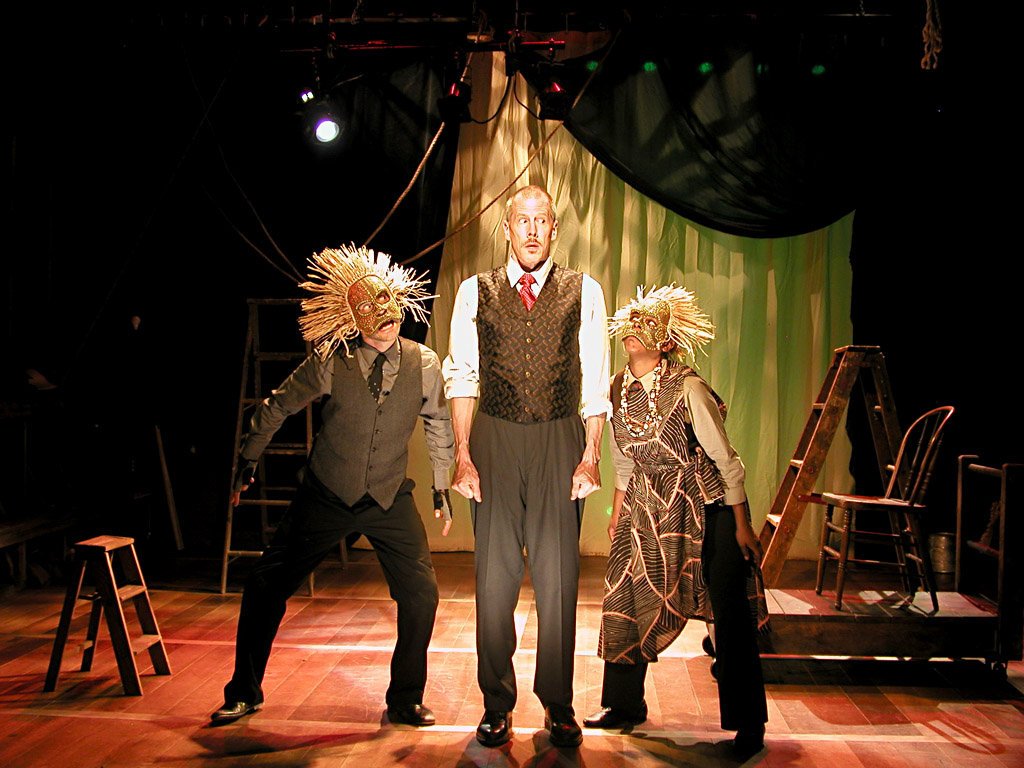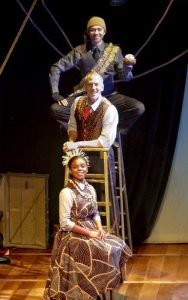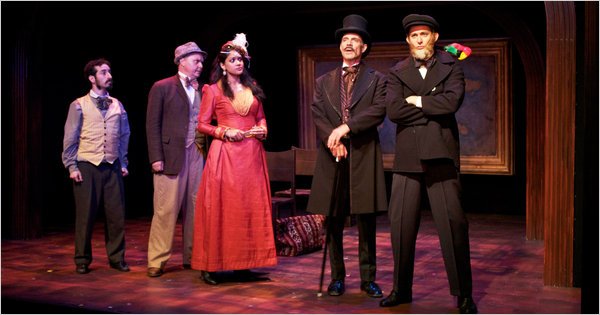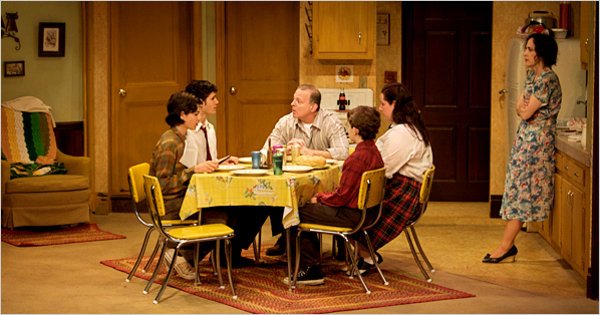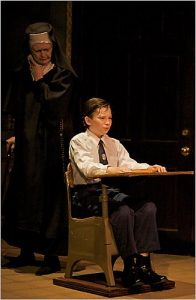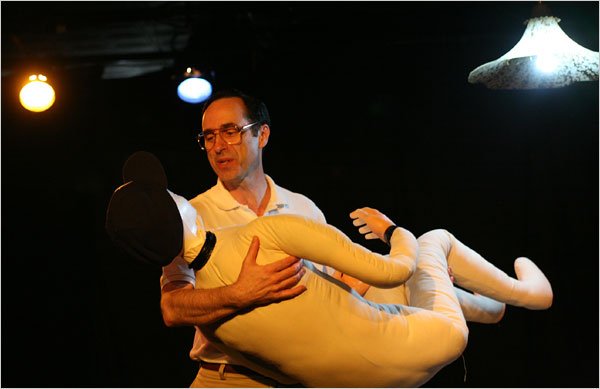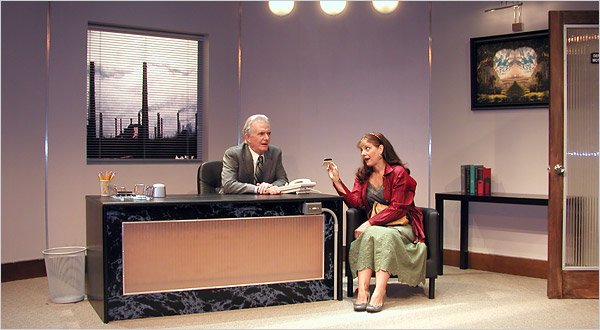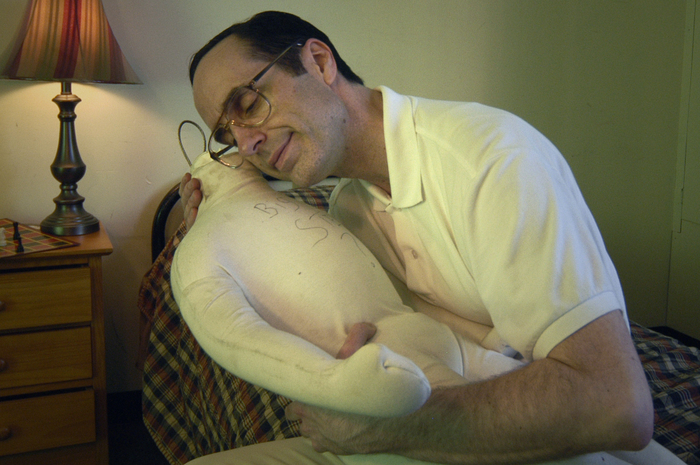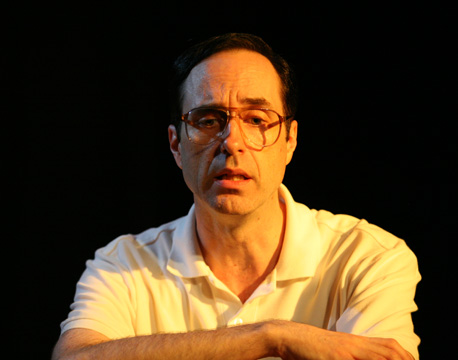Tom Dudzick’s new play, Don’t Talk to the Actors, was highly anticipated for many reasons. Since he wrote Over the Tavern, his comic yet touching celebration of life growing up in an apartment above the family business on Buffalo’s Polish east side, Dudzick has become the Polish Neil Simon. He made an icon of tyrannical yet loving Sister Clarissa, the mythical (and fictional) nun who instructed generations of Buffalonians in penmanship and Catholic morality. He confirmed Chef’s restaurant as a tourist Mecca—equal, in the hearts of the locals, with Niagara Falls. He understands our city’s affection for its ethnic working-class histories, and people of many backgrounds have seen themselves and their own families in his work.
In Don’t Talk to the Actors, Dudzick returns to semi-autobiographical territory. This time we meet Jerry, a young and innocent playwright from Buffalo who, in the company of his equally young and innocent fiancée, makes his first trip to New York City, where his own autobiographical play is being produced on Broadway. Jerry is to learn that the rest of the world is not as “nice” as Buffalo, at least not on the surface.
Will Jerry’s innocence and dreams be shattered, or will goodness prevail?
Get real. This is a Tom Dudzick play. Goodness will prevail.
This production is important for Studio Arena, where artistic director Kathleen Gaffney has begun her first solo season. She has selected the plays. She has assembled the artistic teams. Dudzick’s reinforcing joke fest is intended to jumpstart a season that includes an edgy new musical, a recent A.R. Gurney play, a recent British drama, the retelling of a classic American novel and a musical revue. Dudzick gets us off to a happy start with a play that is solid and engaging, if not perfect in this, its very first outing.
With Don’t Talk to the Actors, Gaffney is quite clearly striving to restore Studio Arena to its glory days without alienating its current audience. The play is a light confection, sweetened with abundant local references and devised to delight. At the same time, it is a world premiere, populated with name talent. In that respect, we are seeing shades of Neal Du Brock, the legendary Studio Arena artistic director, who, throughout the 1960s and ’70s imbued the theater with an undercurrent of excitement, whether he was featuring the world premiere of a challenging Edward Albee play, or featuring Betsy Palmer in his own Countess Dracula.
Don’t Talk to the Actors has been given a first rate production, directed by Thomas Caruso with Denny Dillon, Richard Kline and Lewis J. Stadlen in featured roles; set by Troy Hourie and costumes by Donna McCarthy.
Peter Stadlen (the real life son of Lewis) plays Jerry, the neophyte playwright from Buffalo. In “a snow related miracle that could only happen in Buffalo,” he has been discovered when a Broadway producer is stranded in our city during a blizzard and decides to take in a community theater production. As the play begins, Jerry, accompanied by his girlfriend, Arlene, enters the rehearsal hall, anticipating an environment of selfless professionalism. Oh boy, is he in for a surprise.
The director, a man of greater experience played by the older Stadlen, warns young Jerry, “Don’t talk to the actors.” The advice goes unheeded.
In no time at all, Curt Logan, a 1980s television star (who still dresses the part) has commandeered the production and the author’s girlfriend. It seems that old Curt is only taking a Broadway gig as a showcase for a possible television gig. Bea Pomeroy, the actress hired to play Jerry’s sainted mother, turns out to be Curt’s bawdy television wife; she’s way out of her comfort zone in a domestic drama, and wants to endear herself to the audience by clowning around with risqué ad-libbing.
The strength of the production lies in the remarkable comic talent of the senior Stadlen as Mike, the director; Richard Kline as Curt Logan; and the irrepressible Denny Dillon as Bea. Dudzick’s script supplies the comic nails, and these seasoned pros whack each one down with side-splitting perfection.
Stadlen, for instance, can earn a laugh with a simple announcement like “Nine-ninety-five for two eggs, toast and coffee.” His inflections are infectiously funny as he points out the absurdity in life’s most mundane situations. He can wrest laughs with sardonic observations about the lunacy of other characters, or with a Jackie Gleason spit take. (He executes one to perfection in Act II.)
Kline is best known for playing sleazy Larry Dallas on Three’s Company, the low-brow television comedy of the late 1970s and early ’80s that thrived on the comic genius of a cast that also boasted the late John Ritter, Audra Lindley and Norman Fell. In a performance that lacks any nuance, he brings down the house by enacting the same scene twice to demonstrate how Jerry’s play can be enhanced through “nuance.” He even gets a laugh for a groin gag—it may be low physical comedy, but Kline, a master of his craft, elevates it to high art.
Denny Dillon is assuredly one of the most underrated comic talents of her generation. Unforgettable for her assorted characters on Saturday Night Live, or for her Tony-nominated turn in Broadway’s My One and Only, her entrance in Don’t Talk to the Actors seems to say, “Now this is a party!” She creates hilarity from unbridled stand-up shtick, from incredulous repetitions of lines from the play within the play, or by simply conceding the regrettable truth. Hear her handle variations on the latter when she hands out toiletries as first rehearsal gifts or when she sadly agrees with Curt’s admission that he’s a first class Hollywood shmuck. She literally stops the show with her ribald description of how “slow and steady,” their generous producer Arthur is. Dillon’s is the most deliciously written role in the show and she doesn’t waste an instant of it.
The younger cast members do well just to keep up.
Peter Stadlen is endearing and surprisingly real as the beleaguered playwright, Jerry Przpezniak. The young actor has been entrusted with the heart and soul of the play, for Jerry’s sincerity comes closest to Over the Tavern territory, and the audience dearly does not want to believe that sincerity and goodness are character flaws. Stadlen manages to be a nice guy without being a total schlemiel. This takes some doing when he forgives the fiancée who tries to run off with the sleazy television star she idolizes. Dudzick hands Stadlen the perfect nice guy revenge, when, in the moment of forgiveness, he allows Jerry to ask the girl, “Am I going to have to worry? I mean, there’s a lot of old men in this city!” Thus he insults both fiancée and TV star without ever ceasing to be “nice.”
As Arlene, the fiancée, Dana Powers Acheson, too, proves that she’s got the comic chops to keep up with this crew. Her scenes with Kline are especially memorable, for if he is landing the jokes, she’s setting them up. She is also skilled at physical comedy. She faints like a 1940s ingénue, and the moment in which she releases the brakes to make out with the TV star she adores is hilarious.
Polly Lee gives a solid performance as the easily distressed British stage manager. She deftly barks her way through a succession of inconvenient phone calls, and earns a big guffaw with the old line, “Is it something I said?”
All that being said, one wonders about the play’s future potential. Over the Tavern played all over the country. To liken Dudzick to Neil Simon is a great compliment, but it also signals that this is an old-fashioned kind of play, the sort New York seldom embraces any more. Still, the opportunity to laugh and laugh is very enjoyable, indeed, and as this is the very first production of Don’t Talk to the Actors, Dudzick is only now getting to see how his script actually plays. It is likely that he will want to speed things along in Act I, which takes too long to ignite with its unnecessarily detailed exposition. He has also been adjusting the crowd-pleasing Buffalo references, with a mind to future productions. A joke that in the script read, “You’re from Buffalo? What you’re not from normal parents?” which inspired groans in the Buffalo preview audience, became a joke about spending a week in Buffalo one night.” Dudzick is still tinkering and refining, and he has the experience of a long career of comedy writing to help him along.
Even as it is right now, however, Don’t Talk to the Actors is a pleasure. Thomas Caruso’s production is delightful and his talented cast is marvelous.

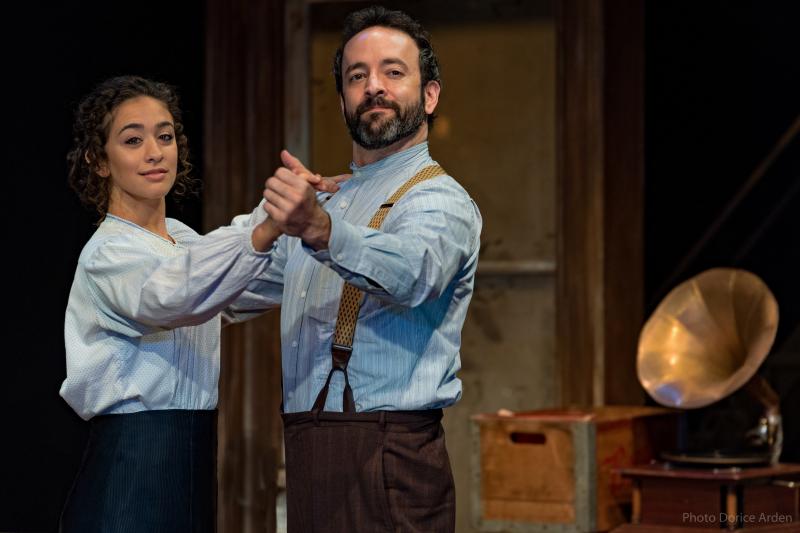
.jpg)

